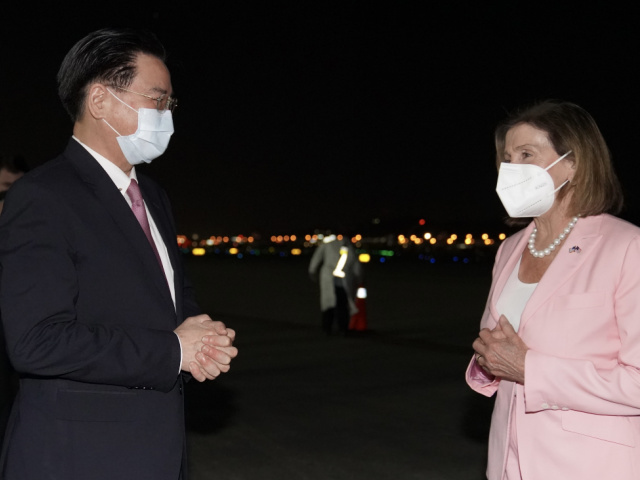Sen. Marsha Blackburn (R-TN) is en route to Taiwan, Breitbart News has learned.
She will meet with several government officials and business leaders while there, sources familiar with the matter told Breitbart News.
The senator’s visit comes in the wake of a visit from House Speaker Nancy Pelosi just a few weeks ago and represents the highest-ranking Republican member of Congress to visit Taiwan since then—and is meant to show strong bipartisan support for Taiwan.

US House Speaker Nancy Pelosi (R) being welcomed by Taiwanese Foreign Minister Joseph Wu (L) after landing at Songshan Airport in Taipei, Taiwan on August 2, 2022 (Photo by Taiwanese Foreign Ministry / Handout/Anadolu Agency via Getty Images).
Blackburn, a strong conservative GOP senator, was supportive of the Democrat speaker’s visit, as were many other Republicans.
Blackburn is also a vocal critic of the Chinese Communist Party (CCP) and has been a target of ire from state-run media in China. She has not drawn ire over this trip yet because Blackburn’s team and U.S. officials kept it under wraps until now.
Blackburn’s visit to Taiwan is part of a broader trip to the Indo-Pacific region she is currently on. She visited Fiji, the Solomon Islands, and Papua New Guinea this week to meet with leaders and hear their concerns about China.
“The Indo-Pacific Region is the next frontier for the New Axis of Evil,” Blackburn said in a statement issued from Papua New Guinea. She continued:
Meeting with leaders from Fiji, the Solomon Islands, and Papua New Guinea was an important step in showcasing America’s commitment to the region and expanding our strategic relationships. Continuing these long-established partnerships is important to the success of both East Asian nations and the United States. I am grateful for their leadership and strength against the Chinese Communist Party. In Washington, I’ve introduced legislation to permanently expand our diplomatic footprint in the area.”
The bipartisan bill Blackburn refers to would establish more U.S. embassies throughout the Indo-Pacific region.
Taiwan, formally known as the Republic of China (ROC), was once a military dictatorship but became a democracy in the late 20th century. The old government of China fell back to the island of Taiwan when Communists took over mainland China in the late 1940s during Communist leader Mao Zedong’s revolution when the Communists won the civil war. The government on the mainland became the People’s Republic of China (PRC), and the Taiwanese government maintained pseudo-independence even though the Communists have long maintained claims to control the island.
Cross-strait tensions have been on the rise in recent years, and Taiwanese officials have stated for years they will not back down to the Communists on the mainland.
The United States used to have formal diplomatic relations with the ROC—and not with the PRC—for decades after the Chinese civil war until the administration of Democrat President Jimmy Carter, when he formally shifted U.S. recognition to the Communist government on the mainland instead of the government on Taiwan. The PRC refuses to have formal diplomatic relations with any nation that has formal relations with the ROC. Several Latin American and Caribbean nations, as well as the Vatican, continue to keep formal ties with the ROC in Taiwan rather than the PRC in Beijing.
Despite the U.S. shift in diplomatic recognition under Carter, Congress overwhelmingly approved the Taiwan Relations Act (TRA)—and later under GOP President Ronald Reagan, the U.S. issued what is known as the Six Reassurances—establishing and maintaining deep informal diplomatic relations between the U.S. and Taiwan.
For status quo purposes, both the PRC and ROC recognize what is called a “One-China policy,” which states only one China exists in the world but disagree on which China is the legitimate one.
U.S.-Taiwan relations have only strengthened in recent years as tensions with the Communists in Beijing have risen.
Taiwan’s Foreign Minister Joseph Wu, who recently very publicly defended Pelosi’s visit to Taiwan, told Breitbart News during a 2019 interview on a trip to Taiwan in the Ministry of Foreign Affairs (MOFA) headquarters in Taipei that the “warmth and support” the U.S. was showing Taiwan under then-President Donald Trump was “unprecedented.” Trump’s administration took several steps to help further open such relations, including passing the Taiwan Travel Act, which encouraged visits between senior government officials on both sides—the U.S. and Taiwan—to the others’ respective countries.

COMMENTS
Please let us know if you're having issues with commenting.